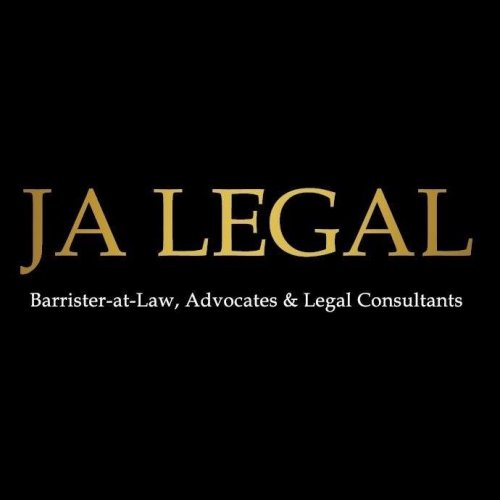Best Art & Cultural Property Law Lawyers in Karachi
Share your needs with us, get contacted by law firms.
Free. Takes 2 min.
List of the best lawyers in Karachi, Pakistan
About Art & Cultural Property Law in Karachi, Pakistan
Art & Cultural Property Law in Karachi, Pakistan, encompasses the legal regulations and protections related to the creation, distribution, sale, and preservation of art and cultural heritage. This field deals with issues such as intellectual property rights, the repatriation of cultural artifacts, the regulation of art trade, and the protection of heritage sites. Given Karachi's rich history and vibrant cultural landscape, these laws are vital for safeguarding the city's diverse cultural assets and supporting its artistic community.
Why You May Need a Lawyer
Legal assistance is often necessary in various situations related to Art & Cultural Property Law. Common scenarios include resolving disputes over art ownership, ensuring compliance with regulations for the sale and export of cultural artifacts, handling issues of copyright infringement, negotiating agreements for exhibitions, and protecting heritage sites from unauthorized developments. Artists, collectors, museums, and cultural institutions often require legal expertise to navigate these complex legal landscapes and protect their rights and interests.
Local Laws Overview
Key aspects of local laws relevant to Art & Cultural Property Law in Karachi include:
- Intellectual Property Rights: The legal framework protects artists' rights over their creations through copyrights, trademarks, and patents.
- Antiquities Act of 1975: This act regulates the protection and preservation of cultural heritage and antiquities, prohibiting unauthorized trade and excavation.
- Customs Regulations: Govern the import and export of cultural goods, ensuring compliance with international conventions.
- Heritage Site Protection: National and provincial laws aim to safeguard designated heritage sites from destruction or alteration.
- Museum and Gallery Regulations: Guidelines for the operation of museums and galleries, including the acquisition and display of art and artifacts.
Frequently Asked Questions
What constitutes cultural property?
Cultural property includes objects and sites of historical, artistic, religious, or cultural significance, such as paintings, sculptures, manuscripts, monuments, and archaeological sites.
Can I legally export cultural artifacts from Pakistan?
Exporting cultural artifacts usually requires government permission, particularly if they are considered national treasures or protected under local laws.
How can I ensure the authenticity of art I purchase?
To verify authenticity, it's advisable to consult experts, request provenance documentation, and undertake due diligence through historical research and technical examination.
What should I do if my artwork is copied without my consent?
If your artwork is used without authorization, you may seek legal recourse through copyright infringement actions to enforce your rights and claim damages.
How are disputes over art ownership resolved?
Disputes are often settled through negotiation, mediation, or litigation, depending on the circumstances, to ascertain rightful ownership and resolve claims.
What are the penalties for unauthorized excavation of cultural sites?
The unauthorized excavation of cultural sites can result in severe legal penalties, including fines, imprisonment, and confiscation of unearthed artifacts.
How can artists protect their intellectual property?
Artists can protect their work by registering copyrights, maintaining meticulous records of their creations, and consulting legal professionals for advice on contracts and licensing.
What is the process for declaring a site a heritage property?
Heritage site designation involves assessment by relevant authorities based on historical significance, which leads to legal protection and conservation measures.
Are there tax incentives for art donations?
The government may offer tax incentives for donations to public museums or institutions, but specific conditions and qualifications typically apply.
Can foreign galleries exhibit Pakistani art?
Yes, but they must comply with local and international legal restrictions, including obtaining necessary permissions and agreements for transportation and display.
Additional Resources
Here are some valuable resources for those seeking assistance with Art & Cultural Property Law in Karachi:
- Department of Archaeology and Museums Pakistan: Oversees the protection and preservation of cultural heritage in Pakistan.
- Intellectual Property Organisation of Pakistan (IPO-Pakistan): Responsible for managing intellectual property rights within the country.
- Karachi Arts Council: Offers support and resources for artists and cultural initiatives in Karachi.
- Pakistan National Council of the Arts (PNCA): Promotes cultural preservation and artistic endeavors nationally.
- Sindh Culture Department: Manages cultural activities and heritage conservation in the Sindh province, including Karachi.
Next Steps
If you require legal assistance in the field of Art & Cultural Property Law in Karachi, take the following steps:
- Assess Your Needs: Determine the specific legal issue you need help with, whether it's related to intellectual property, cultural heritage, or art transactions.
- Research Legal Experts: Seek out attorneys or law firms specialized in Art & Cultural Property Law with experience in handling similar cases.
- Consultation: Schedule consultations to discuss your case, understand potential legal strategies, and evaluate the expertise of prospective lawyers.
- Documentation: Gather all relevant documents, such as ownership records, contracts, and evidence of communication related to your legal matter.
- Legal Action: Upon selecting a lawyer, collaborate with them to formally address your legal needs, whether through negotiation, mediation, or litigation.
Lawzana helps you find the best lawyers and law firms in Karachi through a curated and pre-screened list of qualified legal professionals. Our platform offers rankings and detailed profiles of attorneys and law firms, allowing you to compare based on practice areas, including Art & Cultural Property Law, experience, and client feedback.
Each profile includes a description of the firm's areas of practice, client reviews, team members and partners, year of establishment, spoken languages, office locations, contact information, social media presence, and any published articles or resources. Most firms on our platform speak English and are experienced in both local and international legal matters.
Get a quote from top-rated law firms in Karachi, Pakistan — quickly, securely, and without unnecessary hassle.
Disclaimer:
The information provided on this page is for general informational purposes only and does not constitute legal advice. While we strive to ensure the accuracy and relevance of the content, legal information may change over time, and interpretations of the law can vary. You should always consult with a qualified legal professional for advice specific to your situation.
We disclaim all liability for actions taken or not taken based on the content of this page. If you believe any information is incorrect or outdated, please contact us, and we will review and update it where appropriate.

















